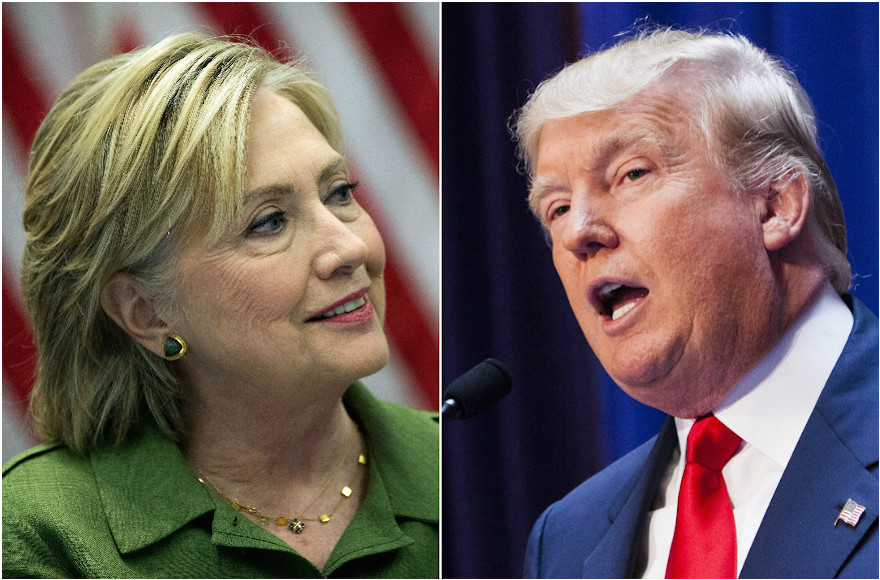Poll shows Clinton trouncing Trump among Jewish voters
Published September 13, 2016

Hillary Clinton (Drew Angerer/Getty Images) and Donald Trump (Christopher Gregory/Getty Images)
WASHINGTON (JTA) — Hillary Clinton trounces Donald Trump among Jewish voters, but under-performs compared to her Democratic predecessors, according to an American Jewish Committee poll that depicts a Jewish community disenchanted with politics and anxious about the country’s future.
The poll released Tuesday shows Clinton, the Democratic presidential nominee, defeating Trump 61 percent to 19 percent among Jewish voters. She outperforms Trump on a range of issues, notably including national security, an area where the Republican nominee hopes to hammer his Democratic rival.
Respondents said Clinton would be better than Trump in handling terrorism (58-22 percent), would be more likely to unite the country (55-11 percent), would be more likely to promote U.S.-Israel relations (57-22 percent) and would be more effective in dealing with Iran (58-19 percent).
Trump, whose daughter Ivanka and son-in-law Jared are Jewish and who has several top Jewish advisers, has nonetheless alienated much of the GOP’s traditional Jewish support, in part because of his broadsides against minorities, but also because of an insular foreign policy. He has flirted with notions of neutrality in the Israeli-Palestinian conflict and of making Israel pay for the defense assistance it receives from the United States.
Still, Clinton, at least for now, was under-performing against her Democratic predecessors, including President Barack Obama, who scored 69 percent in 2012 and 74-78 percent in 2008; John Kerry at 76 percent in 2004; Al Gore with 79 percent in 2000; and her husband, Bill Clinton, with 78 percent in 1996 and 80 percent in 1992.
A substantial chunk – 17 percent — of the AJC’s respondents do not back either candidate, with 6 percent opting for Libertarian Gary Johnson, 3 percent backing Jill Stein, the Green Party candidate and 8 percent saying they will not vote.
Both candidates are among the most unpopular in U.S. history in general polling, where Clinton also has led Trump, albeit by considerably smaller margins than among Jewish voters. The most recent national polling shows Clinton leading Trump by about five percentage points.
Pessimism and exasperation with politics seemed to undergird the polling. More respondents, 39 percent, said American children would be worse off than their parents than those who said they would be better off, 29 percent. Those who said they would be the same were at 27 percent.
Asked how much confidence they had in Congress, 60 percent said they had very little or none, 29 percent said they had some confidence and just 6 percent had “quite a lot” or “a great deal.” Most respondents, 54 percent, said they would vote the straight party line down the ticket on election day, although a substantial minority, 39 percent, said they were ready to vote for one party’s candidate for president and for another party’s for other offices.
Jobs and the economy, as it has in past such surveys, remained among the top issues voters said they would bring with them into the voting booth, with 29 percent saying it was the most important issue, and 22 percent saying it was the second most important issue. Next was terrorism and national security, scoring 16 percent among those who said it was the top issue, and 15 percent among those who said it was second most important.
Asked about anti-Semitism in the United States, 73 percent said it was somewhat of a problem or a very serious problem, while 26 percent said it was not much of a problem or not a problem at all. Regarding university campuses, 57 percent said anti-Semitism was a very serious problem or somewhat of a problem, while 27 percent said it was not much of a problem or not a problem at all.
The AJC did not poll specifically on Israel as a priority, but it was a rare high note among those polled, with 73 percent saying U.S.-Israel relations were fairly good or very good, and 25 percent saying they were fairly poor or very poor. Asked to respond to the sentiment, “Caring about Israel is a very important part of my being a Jew,” 73 percent agreed strongly or somewhat while 26 percent disagreed strongly or somewhat. Asked whether an independent Palestine could exist peacefully alongside Israel, 49 percent said yes and 20 percent said no.
Among religious streams, respondents broke down as 34 percent Reform, tied with 34 percent “just Jewish,” 18 percent Conservative, 9 percent Orthodox and 2 percent Reconstructionist.
Asked the importance of being Jewish in their life, 79 percent said it was somewhat or very important, 21 percent said it was not too important or not important at ll.
The poll of 1,002 adult respondents, carried out in phone interviews by SSRS, a research company between Aug. 8 and 28, has a margin of error of 3.57 percentage points.














